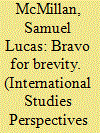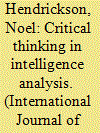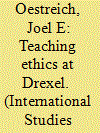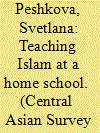|
|
|
Sort Order |
|
|
|
Items / Page
|
|
|
|
|
|
|
| Srl | Item |
| 1 |
ID:
130926


|
|
|
|
|
| Publication |
2014.
|
| Summary/Abstract |
This paper examines the use of short writing assignments in undergraduate international relations courses. It gives instructors ideas about thinking beyond traditional research papers and instead focuses on shorter assignments that demand critical thinking skills. The ability to write concisely is useful for students with future careers in government, business, nonprofits, journalism, electoral politics, or academia. By requiring application of theoretical frameworks (perhaps as policy recommendations in a memo), students can see how policymakers employ international relations theories, thereby simulating the work inside the National Security Council or US State Department. This highlights the connections between theory and policy. Short papers can also better showcase role playing and connect with active learning techniques. Research papers of 10 pages or more may not be as useful as shorter assignments that focus students' attention on analyzing an issue, presenting a case study, or writing a policy brief.
|
|
|
|
|
|
|
|
|
|
|
|
|
|
|
|
| 2 |
ID:
084736


|
|
|
| 3 |
ID:
145519


|
|
|
|
|
| Summary/Abstract |
Global higher education is now situated in an open information environment in which national borders are routinely crossed and cultural identities are constantly shaped through encounters with diverse others. With over 4.5 million students on the move, pedagogical implications are potentially profound to the knowledge structure which so far has been largely affected by a single-dimensional version of history. Located at the very centre of current critical debates on higher educational pedagogy is the most contested issue of ‘critical thinking’ which has been credited as the essential attribute of graduates by all universities in Australia. In management practice, university policy makers have taken up ‘critical thinking’ to benchmark against the deficiency scenario often associated with international students, a large cohort of which come from Asia. This paper engages with the current critical debates and examines three aspects of ‘critical thinking’, the practices of teaching, doing and defending ‘critical thinking’ in university classrooms. In contesting ‘critical thinking’ as the essential attribute of graduates in the Western educational paradigm, this paper argues for an urgent need for a transcultural approach to think critically about the practice of ‘critical thinking’ and for an alternative pedagogical approach to global knowledge domains and knowledge production.
|
|
|
|
|
|
|
|
|
|
|
|
|
|
|
|
| 4 |
ID:
145517


|
|
|
|
|
| Summary/Abstract |
A large amount of literature critiquing the nature and practice of higher education has emerged in the wake of globalisation. This special issue represents a range of intellectual debates around the challenges facing educators in globalised higher institutions, especially where Asian international students are concerned. Read together, the four articles contribute to an emerging body of critical research which de-essentialises solid forms of educational imaginary and embraces heterogeneity of knowledge domains and pedagogy in the ever-changing universe. With a shared vision of providing a high quality, equitable, and global learning experience for all students, these papers interrelate through four parameters: (1) pluralising the disciplinary knowledge base and diversifying curricula and programmes for all students to serve the global community, (2) calling for a progressive pedagogy which takes into account the ‘transcultural’ flow of knowledge on campus and offers students an equal access to quality-orientated education, (3) problematising the ‘imagineering’ of study abroad and proposing a reshaping of research and teaching practices away from a ‘pure’ cultural and intercultural preparation of mobile students and cultural essentialism, and (4) taking into consideration of the fluidity and personal agencies and internationalising effect of international students and moving beyond methodological nationalism.
|
|
|
|
|
|
|
|
|
|
|
|
|
|
|
|
| 5 |
ID:
185766


|
|
|
|
|
| Summary/Abstract |
With the emergence of modern-day warfare techniques including Grey Zone/ Hybrid Warfare and given the share of budget allocated to the Armed Forces, it has become imperative for Armed Forces personnel to focus on “out of box” thinking and leverage human potential to overcome constraints that we face today. The problem is to promote out of box thinking. The solution lies in fostering one important attribute i.e., imagination. It is important to understand and imagine how to defeat an enemy or how to provide security in your area of responsibility because those thoughts might constitute a starting point for something creative. The article carries out an analysis on how to promote ‘Out of Box’ critical thinking in the Indian Armed Forces and gives a Road map for encouraging and developing out of box critical thinking as part of its culture.
|
|
|
|
|
|
|
|
|
|
|
|
|
|
|
|
| 6 |
ID:
113736


|
|
|
|
|
| Publication |
2012.
|
| Summary/Abstract |
Although international politics is an area resistant to moral thinking, this paper argues that it is important to ground students in the basics of international ethics. This is true because some of them will become international affairs professionals; but all will be citizens who need the tools to think critically about their nation's foreign policies. Also, ethical thinking provides a very good way to critique mainstream theories of world politics, by calling into question some of their basic tenets, particularly when these are defended as "rational" and thus beyond criticism. Most textbooks, however, pay too little attention to these problems. A few ways to overcome these shortcomings are suggested.
|
|
|
|
|
|
|
|
|
|
|
|
|
|
|
|
| 7 |
ID:
128704


|
|
|
|
|
| Publication |
2014.
|
| Summary/Abstract |
In this article I describe and analyse non-institutionalized religious education among local women in Uzbekistan. I argue that while exhibiting vestiges of 'traditional' objectives, methods of teaching, and models of knowledge transmission, and incorporating elements of educational reforms advocated by the Central Asian reformers in the early 1900s, and of Soviet pedagogy, the dynamics of such education foster students' critical thinking. By enabling students to think critically about their lives and social environment, the non-institutionalized religious education does not have one predetermined outcome, but ensures social change that starts on an individual level, whereby a student can, but does not have to, engage politically with the state, which systematically intervenes in shaping its citizens' religious lives.
|
|
|
|
|
|
|
|
|
|
|
|
|
|
|
|
| 8 |
ID:
142328


|
|
|
|
|
|
|
|